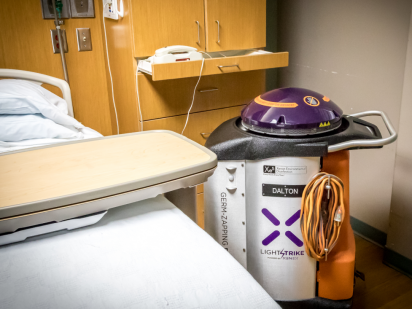Trinity Health has seen a 43 percent reduction in infection rates, with the assistance of the Xenex Germ Zapping Robots since their implementation in April 2016.
In all, a total of 94 infections, including C. Difficile, MRSA, and VRE, have been avoided in the past three years.
The Xenex Disinfection System disinfects surfaces using ultraviolet light hundreds of times more intense than sunlight. Once a room is cleaned, a member of the Environmental Services staff brings the robot into the room, begins the automated sequence, and then leaves the room. The robot then uses the ultraviolet light to destroy bacteria and other pathogens in a matter of minutes.
By no means does the robot substitute the work of the hospital’s Environmental Services staff, who help to keep the hospital clean and safe. Instead, the use of the robots has helped maintain the standards of disinfection.
“Housekeeping has to do their cleaning and disinfection,” explained Sue Niebuhr, RN, coordinator of Trinity Health’s Infection Prevention and Control department, noting that the robot would not be able to obliterate the bacteria without staff diligence. “This is just another layer of protection for patients.”
The hospital strives to maintain its 100 percent goal of disinfecting Intensive Care Unit and Progressive Care Unit rooms following the discharge or transfer of a patient, Niebuhr explained. “If there’s a patient in a room in ICU and they are transferred to the floor, we clean the room and then run the robot in that room. Every time a patient is discharged or transferred out of ICU, we use the robots in those rooms.”
The robots are also used on the medical and surgical floors at Trinity Hospital, she added. “Anytime somebody is discharged and has a multi-drug resistant organism and they were in that room, we clean those rooms and run the robots.”
A multi-drug resistant organism can be difficult to treat, due to limited choices of antibiotics available, hence the importance of the robots, Niebuhr said. “We don’t want to spread those organisms to additional patients.”
The Xenex Germ Zapping Robots were brought to Trinity Hospital with funds made available by the Trinity Health Foundation, in order to offer an extra measure of protection of the hospital’s routine cleaning procedures.

